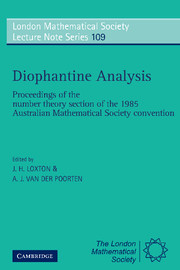 Diophantine Analysis
Diophantine Analysis Book contents
- Frontmatter
- Contributors
- Contents
- Introduction
- 1 An “ideal” transcendence measure
- 2 Galois orbits on abelian varieties and zero estimates
- 3 Small solutions of congruences with prime modulus
- 4 Newton polyhedra and solutions of congruences
- 5 On prime factors of sums of integers II
- 6 An introduction to continued fractions
- 7 Search for the three-dimensional approximation constant
- 8 Inverse problems for Mahler's measure
- 9 Large Newman polynomials
Introduction
Published online by Cambridge University Press: 05 April 2013
- Frontmatter
- Contributors
- Contents
- Introduction
- 1 An “ideal” transcendence measure
- 2 Galois orbits on abelian varieties and zero estimates
- 3 Small solutions of congruences with prime modulus
- 4 Newton polyhedra and solutions of congruences
- 5 On prime factors of sums of integers II
- 6 An introduction to continued fractions
- 7 Search for the three-dimensional approximation constant
- 8 Inverse problems for Mahler's measure
- 9 Large Newman polynomials
Summary
The third Australasian Mathematics Convention was held at the University of New South Wales from the 13th to the 17th of May 1985. The number theory section was particularly active and distinguished. The contributions collected in this volume give an overview of the field of Diophantine Analysis and a guide to problems of current interest in this area.
The papers of Dale Brownawell and Daniel Bertrand are concerned with transcendence methods. In recent times, the classical theory of transcendence has been enriched by a number of techniques from algebraic geometry. One of these is Nesterenko's use of integral Chow forms to obtain transcendence measures. Dale Brownawell gives a down-to-earth introduction to the machinery of Chow forms and shows how it can be used to investigate questions of simultaneous approximation of values of the exponential function at algebraic points. Daniel Bertrand discusses the problem of giving lower bounds for the distance between points of finite order on an abelian variety. Such bounds can be obtained both by l-adic methods and by transcendence arguments combined with the deep results of Masser and Wustholz on zero estimates on group varieties. This circle of ideas includes an analogue of Baker's theorem for linear forms in generalised logarithms and offers the hope of improved lower bounds for linear forms.
- Type
- Chapter
- Information
- Diophantine AnalysisProceedings at the Number Theory Section of the 1985 Australian Mathematical Society Convention, pp. xi - xiiPublisher: Cambridge University PressPrint publication year: 1986
